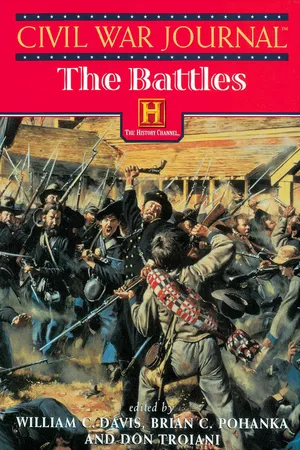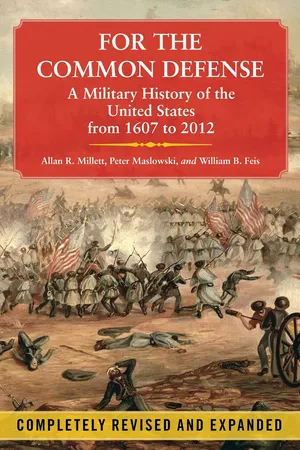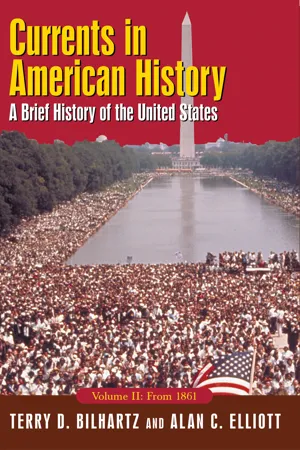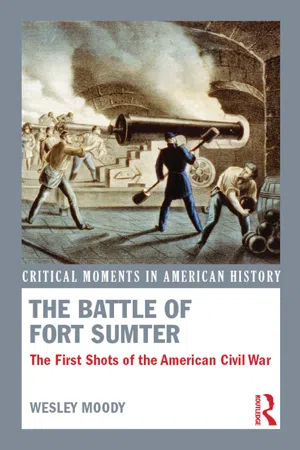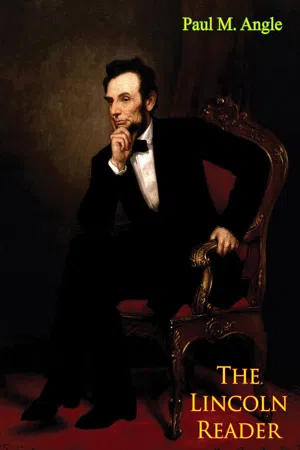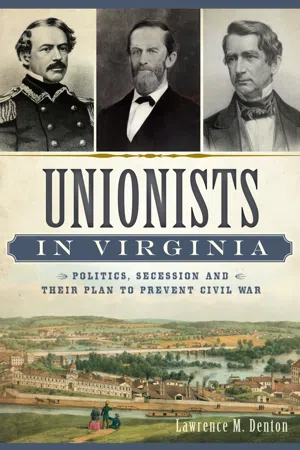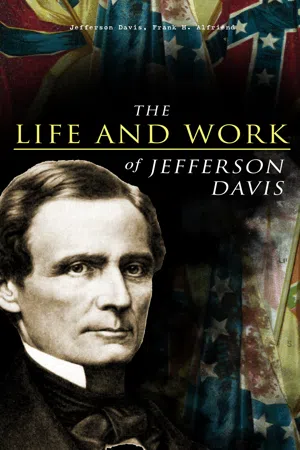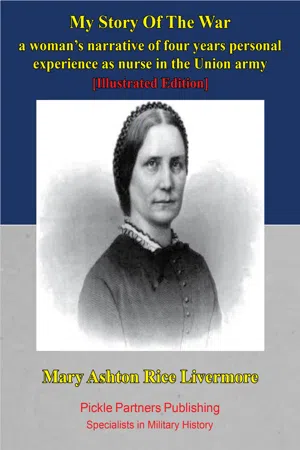History
Fort Sumter
Fort Sumter was a sea fort located in Charleston Harbor, South Carolina. It gained historical significance as the site of the first battle of the American Civil War in April 1861. The Confederate attack on the fort marked the beginning of the war, and the Union's surrender of the fort after a 34-hour bombardment was a pivotal moment in American history.
Written by Perlego with AI-assistance
Related key terms
1 of 5
9 Key excerpts on "Fort Sumter"
- eBook - ePub
Civil War Journal–The Battles
The Decisive Battles of the American Civil War, Turning Points in the History of a Nation
- Thomas Nelson, William C. Davis, Brian Pohanka, Don Troiani(Authors)
- 1997(Publication Date)
- Thomas Nelson(Publisher)
Anderson watched all this political maneuvering on both sides with a grim sense of reality. On March 5, the day after Lincoln’s inauguration, he sent the president a letter urgently requesting relief: “I confess that I would not be willing to risk my reputation on an attempt to throw reinforcements into this harbor . . . for our relief rendered necessary by the limited supply of our provisions.”During the next six weeks the U.S. president agonized over what he should do about Fort Sumter. º Lincoln the politician knew that Sumter was a possible opening wedge to war. His primary commitment to the people, however, was the preservation of the Union. Thus abandoning Sumter to the Confederates would have been a concession he could not make.• After weeks of sleepless nights and chronic headaches, Lincoln came up with a plan that could lure the South into war by forcing it to fire the first shot.EFGTHE SIEGE OF Fort Sumter has been called one of the most brilliant and bloodless clashes of the Civil War. It was a battle fought before the cruelty of warfare touched the hearts and minds of all Americans. While it was fought, families sat perched on their rooftops to watch the blazing spectacle of bombs bursting in air. The action at Fort Sumter began as a gentlemen’s war between the North and South, but its gentlemen’s good–In will was lost in the smoke over Charleston Harbor and led to the bloodiest four years in American history.On the morning of April 13 the Union soldiers within Sumter casually ate their breakfast and then went back to their guns to answer the Confederate bom–bardment. More hot shot was falling inside the barracks. The fort frequently caught fire. By 10:00 a.m. the blaze was virtually out of control, and the Confed–erate mortar shells exploding on the parade ground made any attempts to extinguish the fire impossible. At noon the entire barracks was aflame, and the blaze crept close to three hundred bar–rels of gunpowder. Anderson quickly ordered every available man to move the powder kegs.On April 12, 1861, hours before dawn, the first shots of the Civil War echoed across the harbor of Charleston. Charlestonians, the most vocal of all secessionists, were excited to finally hear the cannons roar. One of them, William Merritt Bristol, said, “All the pent-up hatred of the past months and years is voiced in the thunder of these cannon, and the people seem almost beside themselves in the exultation of a freedom they deem already won.” A reporter for the Charleston Courier - eBook - ePub
- Allan R. Millett, Peter Maslowski(Authors)
- 2012(Publication Date)
- Free Press(Publisher)
SIXThe Civil War, 1861–1862
A t 4:30 A.M. on April 12, 1861, a lightning-like flash and thunderous roar shattered the predawn stillness at Charleston, South Carolina. A mortar shell arced across the sky, its burning fuse etching a parabolic path toward Fort Sumter. Moments after the shell exploded, guns ringing the harbor began battering the fort as if “an army of devils were swooping around it.” For thirty-four hours artillery commanded by General Pierre Gustave Toutant Beauregard fired at Sumter, setting numerous fires and knocking huge masonry flakes in all directions. Miraculously, the seemingly murderous barrage killed none of the fort’s soldiers or workmen. But the commanding officer, Major Robert Anderson, who had been Beauregard’s artillery instructor at West Point, knew the good luck could not continue. Having satisfied the demands of duty and honor, he ordered the Stars and Stripes lowered and the white flag raised. The Civil War had begun.Decades of sectional disagreements over the expansion of slavery into the territories and, for a small minority of northerners, the moral implications of the institution, fueled sharp differences over states’ rights versus national authority and propelled the divided nation toward that fateful moment in Charleston Harbor. Once war became a reality, many people on both sides offered predictions regarding its probable duration and who would triumph. Few, however, foresaw exactly what the war would be like. Most people optimistically predicted a brief conflict waged with the romantic heroism of a Sir Walter Scott novel. Instead, the outlines of modern total warfare emerged during a four-year ordeal. Since both sides fought for unlimited objectives—the North for reunion and (eventually) emancipation, the South for independence and slavery’s preservation—a compromise solution was impossible. No short, restrained war would convince either side to yield; only a prolonged and brutal struggle would resolve the issue. - eBook - ePub
Currents in American History: A Brief History of the United States, Volume II: From 1861
A Brief History of the United States, Volume II: From 1861
- Alan C. Elliott, Terry D. Bilhartz(Authors)
- 2023(Publication Date)
- Routledge(Publisher)
Southern predictions that northerners would be wary of going to war proved hopelessly wrong. Instead, the news accounts of the fall of Fort Sumter rallied thousands of volunteers in the North and cemented Lincoln's determination to preserve the Union at all costs. Shouts of “Remember Fort Sumter” and “Save the Union” echoed throughout the northern states. Letter envelopes depicting the American flag flying over Fort Sumter and inscribed “Our flag shall wave and none other” were printed and widely used. A coined medal depicting the likeness of Lincoln bore the legend, “The Fall of Sumpter [sic] Will be Avenged and the Rebellion Crushed and the Honor and Integrity of the United States Shall be Maintained.” In response, a popular southern song urged,Ye sons of Carolina! Awake from your dreaming!The Minions of Lincoln upon us are streaming!Oh! Wait not for argument, call or persuasion,To meet at the onset this treach'rous invasion!The opening volley of cannon shot at Fort Sumter marked in a turning point in American history as the long and tragic American Civil War commenced, with both sides fighting for what they believed was a just and honorable cause.The Immediate Aftermath: The American Civil War
After the fall of Fort Sumter, President Lincoln asked the states to supply 75,000 volunteers to crush the rebellion against the United States. Citizens from every corner of the Union but one responded immediately to the call. By firing at the flag, the Confederates in a single day had brought a greater degree of unity to the northern states than had been achieved in four generations of political debate. Within a week, tens of thousands of white and black males crammed into enlistment offices to volunteer for duty (although initially only the white recruits were accepted), even as northern women demonstrated their patriotism by organizing relief societies that provided clothing, blankets, and supplies for the troops. Upon witnessing a parade of volunteers marching through the streets of New York, poet and composer George Templeton Strong exclaimed, “My eyes filled with tears, and I was half choked in sympathy with the contagious excitement. God be praised for the unity of feeling here! It is beyond, very far beyond, anything I hoped for.” - eBook - ePub
- Brian Holden Reid(Author)
- 2014(Publication Date)
- Routledge(Publisher)
Yet this attitude, which was so important to both sides in sustaining the somewhat mythical (and over-strained) time-honoured tradition that Americans behave only defensively, never aggressively, was in one very profound sense irrelevant. If principles were at the forefront of everybody’s mind, then the symbolism pervading the confrontation could easily be extended to the forts in question. This was what happened to Fort Sumter, which became a symbol for both sides. It also became a symbol that both sides were pursuing their objectives defensively. Yet two defensive attitudes may produce an offensive act in the same way that two negative poles make a positive. 4 What were they arguing about and why did these properties assume a symbolic significance? The four properties offering the most blatant provocation were those found in the environs of Charleston, South Carolina. They included Fort Sumter (still unfinished but dominating Charleston harbour because of its location on a tiny island in the harbour entrance) and Fort Moultrie, Fort Johnson and Castle Pinckney, all nestling in the basket of secessionist vipers. Less exposed was Fort Pickens, near Pensacola, Florida. Pickens was less vulnerable, mainly because it lay outside any harbour, while Castle Pinckney, Fort Johnson and Fort Moultrie not only were weak and undermanned fortifications (Castle Pinckney boasting a garrison of one quartermaster sergeant) but also could easily be isolated from relieving naval forces. Even Sumter could not easily be succoured because any vessels coming to its rescue could easily be fired on from shore batteries (see maps). 5 These forts were held by virtue of a contract or sometimes a conditional cession from the parent state. There were obviously ways of securing legal redress for the loss of such installations if the Federal government was prepared to recognize southern independence. But this was begging the question - eBook - ePub
The Battle of Fort Sumter
The First Shots of the American Civil War
- Wesley Moody(Author)
- 2016(Publication Date)
- Routledge(Publisher)
Chapter 4 Securing Sumter and the Birth of the Confederacy DOI: 10.4324/9781315768687-4Even before the emotional flag raising over Fort Sumter, Major Robert Anderson and his small garrison began to prepare the fort for an attack. Anderson had no way of knowing how South Carolina would react to his movements. His garrison might have been in a fight before the sun rose. Anderson and his officers expected a direct assault. Men landed on the island might be able to overwhelm the small garrison. Fort Sumter was built to fight an enemy at long range. Fully manned with all its cannons blazing, an enemy force would be unable to get anywhere near the fort. Because of this, it was not designed for a small force to defend it against an infantry attack. The old veteran Anderson would set about to change this.Preparing the Fort for an Assault
The first obvious danger were the embrasures, the openings that the cannons were fired through. These forty two openings were closed and blocked as quickly as possible. No attack came that first night, when an assault would have had the best chance of success. Among the civilian workers, Captain Foster identified the men who were loyal to the Union and released the rest. It was those workers, who were sent away that confirmed Anderson’s movement to the people of Charleston.1The men who remained would prove invaluable in aiding the garrison with the massive amount of labor necessary in making Fort Sumter battle ready.Building materials lay everywhere. If the fort had been shelled the bricks and other supplies laying around would have been turned into deadly shrapnel. Soldiers had trouble navigating the parade ground with sixty six un-mounted guns, almost six thousand projectiles, stacks of bricks and the sand needed to make mortar. Only fourteen guns had been mounted and all faced the sea, not the enemy. The fort had three tiers, but the middle one was mostly unfinished. Among the living quarters, only the officer’s quarters were finished. These were designed with small porches that opened on the outside of the fort. This was a very nice addition for the comfort of the officers but a serious weakness in the event of an assault. - eBook - ePub
- Paul M. Angle(Author)
- 2016(Publication Date)
- Golden Springs Publishing(Publisher)
CHAPTER SIXTEEN—The War Begins
1THE FIRING ON Fort Sumter snapped a tension that was tighter than most of those who had been enduring it realized. On April 15, one day after Anderson’s surrender, Lincoln issued his proclamation calling out the militia to the number of 75,000. The North responded almost as one man. Mass meetings convened, wealthy citizens subscribed money to equip troops, and military companies vied with one another to be the first to fill their complements. Fife and drum sounded day and night in hamlet as well as city, while women wore out their eyes and fingers sewing flags and uniforms. Had the call been for five times 75,000, the quota would still have been met with men to spare.ONE REASON—a primary one—for the response of the North was the stand taken by the man who had been Abraham Lincoln’s political rival for almost a quarter of a century. Though defeated for the presidency, Stephen A. Douglas was still the leader of the Northern wing of the Democratic party and idolized by vast numbers of its members. The way in which he subordinated personal and political considerations to patriotism is delineated by George Ashmun, of Massachusetts, who had presided over the Republican National Convention which nominated Lincoln. Ashmun’s analysis was written in October, 1864, when the events it related were still vivid in his memory.ON SUNDAY, April 14, 1861, Washington was agitated by the spread of the information of the fall of Fort Sumter, the news of which had arrived the night before. Such an event could not but produce a profound feeling at the seat of government, and discussions of the event largely displaced all the ordinary Sunday ceremonies. The course which the new Administration would take was then quite unknown, and gave ground for much anxiety. For myself, I felt that the occasion was one which demanded prompt action and the cordial support of the whole people of the North, and that this would be greatly ensured by a public declaration from Mr. Douglas. The friendly personal relations which had long existed between us justified an effort in that direction on my part; and late in the afternoon I decided to make it. On driving to his house, I found him surrounded by quite a number of political friends, whom he, however, soon dismissed with an easy grace on a suggestion of the errand which had brought me there. Our interview lasted an hour or more, and in the course of it the whole nature of his relations to Mr. Lincoln’s administration, and his duty to the country, were fully discussed. His first impulse was decidedly against my purposes. I desired him to go with me at once to the President, and make a declaration of his determination to sustain him in the needful measures which the exigency of the hour demanded, to put down the Rebellion which had thus fiercely flamed out in Charleston harbor. I well remember his first reply: “Mr. Lincoln had dealt hardly with me in removing some of my friends from office, and I don’t know as he wants my advice or aid.” My answer was that Mr. Lincoln had probably followed Democratic precedents in making removals; but that the question now presented rose to a higher dignity than could belong to any possible party question; and that it was now in his (Mr. Douglas’s) power to render such a service to his country as would not only give him a title to its lasting gratitude, but would at the same time show that in the hour of his country’s need he could trample all partisan considerations and resentments under foot. The discussion in this vein continued for some time, and resulted in his emphatic declaration that he would go with me to the President and offer a cordial and earnest support. But I shall never forget that before it was concluded his beautiful and noble wife came into the room and gave the whole weight of her affectionate influence toward the result which was reached. My carriage was waiting at the door, and it was almost dark when we started for the President’s house. We fortunately found Mr. Lincoln alone, and, upon my stating the errand on which we had come, he was most cordial in his welcome, and immediately prepared the way for the conversation which followed, by taking from his drawer and reading to us the draft of the proclamation which he had decided to issue, and which was given to the country the next morning. - eBook - ePub
Unionists in Virginia
Politics, Secession and Their Plan to Prevent Civil War
- Lawrence M. Denton(Author)
- 2014(Publication Date)
- The History Press(Publisher)
312 No further communication was received at the fort. The command was now totally isolated, thanks mostly to the bungling politicians in Washington.In the nation’s capital, tension was mounting by the hour. Rumors of “war to begin” were everywhere. Abraham Lincoln had decided to continue business as usual at the White House. He spent most of the day interviewing folks for minor offices and received various messages about the Fort Sumter and Fort Pickens missions. Correspondents for the nation’s newspapers were madly dashing to and fro as they tried, with little success, to track down rumors from A to Z. Many of the nation’s leading papers had suddenly begun to urge caution. “To what good end shall we inaugurate a civil war?” asked the Daily Chicago Times. “Evil, and evil alone, can come to us by civil war.”313 Seward kept up a “fair face” but was disheartened by the unfolding events that he now knew surely meant war.Wednesday, April 10, was not a good day for the Fort Sumter mission. A terrific storm had dumped so much rain on central Virginia that it had washed out some rail service. The storm was now off Cape Hatteras and began to engulf the ships of the Sumter mission as they steamed south. Ships became separated, supplies were lost overboard and men got seasick. From Hampton Roads, a real Navy warship, the Pawnee, sailed into the storm, bound for Charleston. Crawford recorded a riveting scene at the fort on the morning of the tenth: “[I] saw Major Anderson alone, walking slowly backward and forward among his guns. He was greatly depressed; he seemed to realize that upon himself rested mainly the great responsibility. He had endeavored to avert the crisis upon him by every means in his power; he had failed, and the struggle was unavoidable and imminent. His sense of duty now overcame every other consideration, and he prepared to meet the worst.”314 - eBook - ePub
The Life and Work of Jefferson Davis
Complete Biography, History of the Confederate States of America & The Rise and Fall of the Confederate Government
- Jefferson Davis, Frank H. Alfriend(Authors)
- 2017(Publication Date)
- Madison & Adams Press(Publisher)
Major First Artillery U. S. A., commanding.Fort Sumter, South Carolina , January 9, 1861.Extracts from reply of the Governor to Major Anderson.State of South Carolina, Executive Office, Headquarters , Charleston , January 9, 1861.Sir : Your letter has been received. In it you make certain statements which very plainly show that you have not been fully informed by your Government of the precise relations which now exist between it and the State of South Carolina. Official information has been communicated to the Government of the United States that the political connection heretofore existing between the State of South Carolina and the States which were known as the United States had ceased, and that the State of South Carolina had resumed all the power it had delegated to the United States under the compact known as the Constitution of the United States. The right which the State of South Carolina possessed to change the political relations it held with other States, under the Constitution of the United States, has been solemnly asserted by the people of this State, in convention, and now does not admit of discussion.The attempt to reënforce the troops now at Fort Sumter, or to retake and resume possession of the forts within the waters of this State, which you have abandoned, after spiking the guns placed there, and doing otherwise much damage, can not be regarded by the authorities of this State as indicative of any other purpose than the coercion of the State by the armed force of the Government. To repel such an attempt is too plainly its duty to allow it to be discussed. But, while defending its waters, the authorities of the State have been careful so to conduct the affairs of the State that no act, however necessary for its defense, should lead to a useless waste of life. Special agents, therefore, have been off the bar, to warn all approaching vessels, if armed, or unarmed and having troops to reënforce the forts on board, not to enter the harbor of Charleston; and special orders have been given to the commanders of all the forts and batteries not to fire at such vessels until a shot fired across their bows would warn them of the prohibition of the State. - eBook - ePub
My Story Of The War:
A Woman's Narrative Of Four Years Personal Experience As Nurse In The Union Army [Illustrated Edition]
- Mary Ashton Livermore(Author)
- 2014(Publication Date)
- Golden Springs Publishing(Publisher)
CHAPTER I.
THE BEGINNING OF THE WAR—THE SPIRIT OF 1861—FIRST CALL FOR VOLUNTEERS—UPRISING OF THE NORTH—EXCITING SCENES AND INCIDENTS.
In Boston with my dying Father—His early History—Surrender of Fort Sumter—Uprising of the North—President Lincoln’s Call for Seventy-five Thousand Troops—Their Rendezvous in Faneuil Hall—Departure of the Massachusetts Sixth for Washington—Scenes at the Boston and Albany Station—Interview with Mr. Garrison and Wendell Phillips—The Massachusetts Sixth attacked in Baltimore—War Scenes in Auburn, N. Y.—My Return to Chicago—Impressive Scenes in the Republican Wigwam—Cairo, Ill., a strategic Point—North and South hasten to seize it—Chicago Troops arrive first and take Possession—Increased Preparations for War—Washington carefully guarded—Defeat at Bull Run—The North nerved to Power and Purpose—The South exultant in Self-Confidence—Lines now sharply drawn between loyal and disloyal States.
Passage contains an image
AFTER THE BATTLE.
THE opening of the War of the Rebellion found me in Boston, my native city. My own home had been in Chicago for years, but my aged father was thought to be dying, and the stern speech of the telegram had summoned me to his bedside. It was a time of extreme and unconcealed anxiety. The daily papers teemed with the dreary records of secession. The Southern press blazed with hatred of the North, and with fierce contempt for her patience and her avowed desire for peace. Northern men and women were driven from Southern homes, leaving behind all their possessions, and thankful to escape with life. Every one was asking his neighbor, “What will be the end?” but there was no answer, for over the whole North the paralysis of death seemed to have settled.The day after my arrival, came the news that Fort Sumter was attacked, which increased the feverish anxiety. The threats of its bombardment had been discredited, for the North believed the South to be as deeply rooted in attachment to the Union as it knew itself to be. All its high-sounding talk of war was obstinately regarded as empty gasconade, and its military preparations, as the idle bluster of angry disappointment. When, therefore, the telegraph, which had registered for the astounded nation the hourly progress of the bombardment, announced the lowering of the stars and stripes, and the surrender of the beleaguered garrison, the news fell on the land like a thunderbolt.
Index pages curate the most relevant extracts from our library of academic textbooks. They’ve been created using an in-house natural language model (NLM), each adding context and meaning to key research topics.
